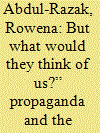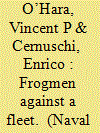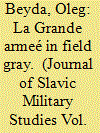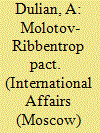| Srl | Item |
| 1 |
ID:
149269


|
|
|
|
|
| Summary/Abstract |
The 1941 Anglo-Soviet occupation of Iran is a topic that continues to interest historians. Work on this period has mainly focused on the reasons behind the occupation and its impact on the political situation in the country. This article looks at the psyche of the occupying forces by studying their propaganda tactics during this period. It was through propaganda that both were able to manipulate local players to either further their own interests or damage the reputation of the other. Such tactics were reflective of the dynamic nature of British‒Soviet relations and had a direct consequence on the politics of Iran. A key aspect of this was the British machine’s promotion of the Tudeh Party’s legacy as a tool of the Soviets. The propaganda patterns reveal the reactive nature of the occupying force’s policy in Iran, and reflected their changing interests.
|
|
|
|
|
|
|
|
|
|
|
|
|
|
|
|
| 2 |
ID:
146367


|
|
|
|
|
| Summary/Abstract |
In March 1939 Italy’s Regia Marina established a specialized and secret naval warfare unit called Decima Flottiglia MAS (Motoscafo Anti Sommergibili), generally known as the 10th Light Flotilla or X MAS. This unit was innovative, in that it employed selected, highly trained personnel using special weapons and delivery systems to conduct sneak attacks. On the night of 18 December 1941, six members of this unit penetrated the main British naval base in the eastern Mediterranean at Alexandria, Egypt, and disabled the Mediterranean Fleet’s two battleships, a tanker, and a destroyer
|
|
|
|
|
|
|
|
|
|
|
|
|
|
|
|
| 3 |
ID:
147815


|
|
|
|
|
| Summary/Abstract |
This article has been compiled on the basis of documents from French, German, and Soviet archives and reconstructs the history of the Legion of French Volunteers Against Bolshevism (LVF) in 1941. Often neglected or scarcely mentioned, the 638th Infantry Regiment was the only formation of the Wehrmacht that took part in the advance on Moscow. Undertrained, poorly equipped, and torn by inside political rivalries, the regiment still marched to the front and fought the Red Army in December 1941. Being almost destroyed, the formation was then withdrawn and thoroughly purged and reshaped by the Germans, who wanted to gain more from the collaboration with the Frenchmen. The experience of 1941 thus constitutes the first — even if unsuccessful — stage of this collaboration, both military and political, that dragged on until 1944.
|
|
|
|
|
|
|
|
|
|
|
|
|
|
|
|
| 4 |
ID:
093750


|
|
|
|
|
| Publication |
2009.
|
| Summary/Abstract |
On 23 August 1939, Foreign Minister of Germany Joachim von Ribbentrop arrived to Moscow. After intensive talks that went well into the small hours of August 24 the Soviet Union and Germany signed a non-aggression treaty also known as the Molotov-Ribbentrop Pact by the names of the ministers who signed it as well as a secret protocol "on the delimitation of spheres of mutual interests in Eastern Europe.
|
|
|
|
|
|
|
|
|
|
|
|
|
|
|
|
| 5 |
ID:
168980


|
|
|
|
|
| Summary/Abstract |
The June 1941 German invasion of the Soviet Union unleashed a series of events that culminated in the Allied invasion of Iran two months later. In their propaganda, Britain and the Soviet Union publicly justified that invasion as a means of preventing Iran from falling into the German orbit. However, a review of radio broadcasts of the time shows the theme of a German menace was not widely believed in the region. Using BBC Summary of World Broadcasts transcripts from the period, this paper argues that the decision to base their propaganda on a lie also negatively affected relations in the postwar world. In that sense the decision to justify the invasion on the basis of German presence was a propaganda failure for the allies.
|
|
|
|
|
|
|
|
|
|
|
|
|
|
|
|
| 6 |
ID:
172258


|
|
|
|
|
| Summary/Abstract |
This paper examines how fighter aircraft shortages affected the Royal Air Force’s ability to contest control of the air over the island of Crete in 1941. It shows how dysfunctional personal relations and extended lines of communication combined to obscure decisions, and it unpicks the claim that the loss of Crete was a function of the British army’s inability to protect the airfields required to sustain viable fighter defenses. Instead, it shows that the key decision-makers in London knew that the fighter aircraft destined for the region would arrive too late to affect the course of events.
|
|
|
|
|
|
|
|
|
|
|
|
|
|
|
|
| 7 |
ID:
152692


|
|
|
|
|
| Summary/Abstract |
BY ITS ATTACK at the Soviet Union fascist Germany destroyed the international balance of power. The documents of the People's Commissariat for Foreign Affairs of the USSR (NKID SSSR) said that "on the strength of circumstances the Soviet Union and England became comrades-in-arms, that is, if not formal then the de facto allies at the time of war."1 On June 22, 1941, the day when Germany attacked the Soviet Union, Foreign Secretary of the UK Anthony Eden said to Soviet Ambassador to Great Britain Ivan Maysky that the declared war had not changed Britain's policies and that it would pour even more efforts into its struggle with Germany.2 On the same day, Prime Minister of Great Britain Winston Churchill said in his broadcasted address: "Any man or State who fights against Nazism will have our aid. Any man or State who marches with Hitler is our foe.... That is our policy and that is our declaration. It follows, therefore, that we shall give whatever help we can to Russia and to the Russian people."
|
|
|
|
|
|
|
|
|
|
|
|
|
|
|
|
| 8 |
ID:
107118


|
|
|
|
|
| Publication |
2011.
|
| Summary/Abstract |
GENERATIONS OF SOVIET PEOPLE and citizens of the Russian Federation have been asking the same question: Was the Soviet Union ready to rebuff Hitler's aggression on June 22, 1941? If the country was completely ready why the crushing defeats and appalling casualties of the first months of the war? If it was not prepared then who is to blame?
In many respects (the number and efficiency of heavy tanks) the Red Army was much superior to the Wehrmacht which had no heavy tanks at the early stages of war in the East.
Why then the humiliation of the early months?
|
|
|
|
|
|
|
|
|
|
|
|
|
|
|
|